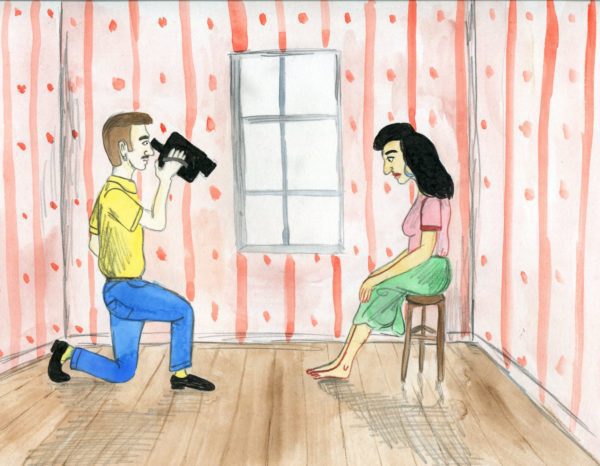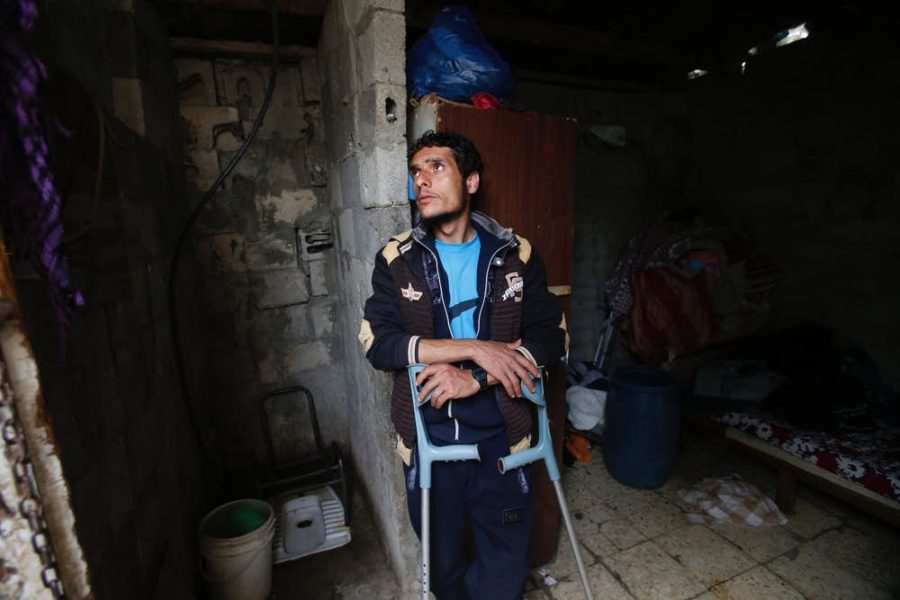Published on 9 Mar 2017, on B’Tselem Website.
Since September 2000, Israel has maintained a “buffer zone” along the fence with Gaza, inside Gaza’s territory.
To that end, it has restricted the access of Palestinians to farmland that they own nearby.
Over the years, the military has occasionally changed the range of the area it considers off-limits to Palestinians, from 100 to 500 meters away from the fence.
The military has not informed Gaza residents of the boundaries of the prohibited area, nor has it posted signs to demarcate the area. Also, there is often a gap between official statements about the prohibited area and the military’s conduct on the ground, leaving farmers who wish to work their land nearby in a constant state of uncertainty. As the prohibition on entering the “buffer zone” is enforced with shooting, this puts the farmers in grave danger. Over the years, the military has killed and injured hundreds of civilians in this area, including farmers, laborers, and protestors, who posed a danger to no one.
Since the end of the fighting in Operation Protective Edge in 2014, the military has allowed Gazan farmers to cultivate land up to a distance of 100 meters from the perimeter fence. The military has also sprayed along the fence twice a year, in December-January and again in April, in order to maintain the “buffer zone”, in which crops are not grown. In practice, the spraying also damages the farmland that lies beyond the 100-meter limit.
This year, for the first time, the military issued advance notice of its plans to spray the area near the border, to allow the farmers to make the necessary preparations to protect their crops. In December 2016, the Red Cross informed the Palestinian Ministry of Agriculture that the military would be spraying along the Gaza-Israel border from the area of Beit Hanoun, in the north, to Rafah, in the south, between 25 December 2016 and 5 January 2017.
The Ministry notified the farmers whose fields lie within several hundred meters of the fence regarding the spraying times, and instructed them to make the necessary preparations – to pick crops that were ready, to cover the remaining crops with plastic sheeting, and to run drip irrigation systems to minimize the damage. The farmers prepared accordingly. Throughout the first three days of January, the military did spray the northern part of the area, and the damage was contained.
However, on 23 and 24 January, the military resumed spraying with no prior notice, this time along the border from central to southern Gaza. The farmers, who were caught unprepared, sustained heavy losses.
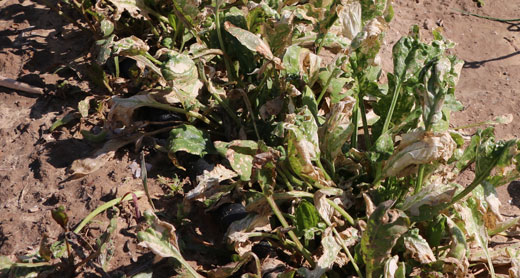
On 23 January 2017, around 7:00 A.M., farmers in the al-Qararah area, in southern Gaza, observed two planes spraying farmland along the border on the Gaza side. The spraying lasted until the early afternoon and resumed the next day. Strong winds carried the sprayed chemicals and they damaged fields as far as 600 to 1200 meters into the Gaza Strip. In addition, it appears that this year, the military used higher-concentration chemicals, as the damage to the crops was detectable the very next day, rather than two to three days as in the past.
The Ministry reported that some 400 hectares of farmland were damaged along the border. In the 200 hectares in the north, where farmers had prepared, the damage was minor to moderate. However, in central and southern Gaza, some 200 hectares of farmland sustained heavy damage, both because farmers were not given a chance to prepare for the spraying and because most of the crops grown in this area are leafy and more sensitive to the chemicals used by the military. The Ministry did not allow farmers to sell the damaged crops, and they were forced to destroy them and re-plow the land. According to Ministry estimates, the losses incurred by farmers in these areas amount to approximately 80 USD per hectare.
In a response provided to human rights organization Gisha in 2016, the military said that the spraying was necessary in order to “enable optimal and continuous security operations”. However, such widespread harm to farmers belies this claim, particularly when the spraying damages wide areas stretching hundreds of meters away from the border, time after time. If Israel believes a “sterile” buffer zone near the border is critical for its security, it must institute one in its own territory. It certainly cannot harm farmers’ crops so extensively and indiscriminately.
B’Tselem field researchers Khaled al-‘Azayzeh and Muhammad Sa’id visited the damaged areas in southern Gaza on 5 February 2017, and collected testimonies from farmers:
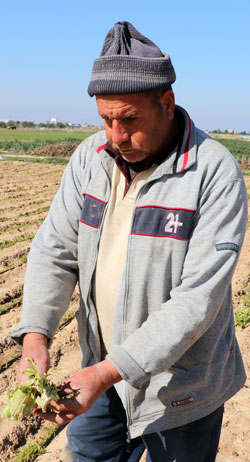
Salah Muhammad Suliman a-Najar, 53, a farmer and married father of six from al-Qararah, Khan Yunis District, described the damage caused to his crops:
I have worked all my life as a farmer. I now farm about six hectares of leased land, which are all 400 to 650 meters away from the border with Israel. I grow spinach, corn, fava beans, lentils, and wheat. Out of all these crops, only the fava beans were ready for picking before the spraying. The spinach leaves were supposed to be ready for picking and selling in the market in about twenty days. On Monday, 23 January 2017, at 7:00 A.M., I was in my plot, as I am every day. Suddenly, a spray plane belonging to the occupation authorities appeared and started spraying along the border fence. The wind was blowing from east to southwest that day, so it was blowing toward our fields and herbicide residue reached my plants.
I called the Red Cross and the Ministry of Agriculture right away and told them what was happening. At 10:00 A.M. that day, when the Red Cross was present, another plane arrived and continued spraying in the area. They kept spraying until the afternoon. I lost my entire spinach crop – the leaves were burned and it was completely destroyed. It won’t grow back. As for the other crops – the plants will only reach 50% of their size, because of the damage to the sapling leaves. Also, the Ministry of Agriculture and the Ministry of Health forbid selling spray-damaged plants in the market, and their instructions are to destroy all damaged crops.
I lost all the money I put into those crops – 40,000 Israeli shekels (~10,800 USD) for fertilizer, seeds, plowing, and spraying. All that money went down the drain, and now I owe more than 40,000 shekels to various suppliers. I’ll have to get the land ready again and replant it. This month I’m going to plant peppers, and I’ll have to cover them with plastic sheeting to protect them, in case they spray again.
I’ve sustained losses from the military’s spraying in the past, and no one has ever compensated me for them.
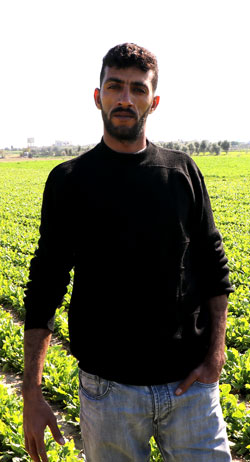
Riyad Rizeq Ibrahim Abu Samur, 32, a farmer and married and father of eight from a-Zanah, Khan Yunis District, also spoke about the heavy damage he sustained:
I have been working as a farmer for seventeen years now. I currently lease about ten hectares of land where I grow spinach, wheat, parsley, cabbage, basil, and khubeiza (mallow). The plots are located about a kilometer west of the border fence. On Monday 23 January 2017, at 7:00 AM, I was in my plot. The wind was blowing from east to southwest, toward our land. A spray plane came and started spraying herbicides along the fence, and the residue reached my plants.
I started shouting frantically and spraying agricultural remedies like Manzidan to try and save the crops. The spray plane continued working until the afternoon. In fact, there were two planes doing the spraying. I called the Ministry of Agriculture and the Red Cross. Some Red Cross people came and started filming the planes while they were spraying.
About two days later, the crops started showing signs of damage. My spinach crop was completely burnt. The onion stopped growing and the khubeiza, basil, parsley, cabbage, and wheat were also burnt. The spinach, parsley, cabbage, and khubeiza were ready for sale, but now I won’t make a single shekel off them because of the spraying. I harvested all the crops and threw everything out. I can’t sell any of the damaged crops because the Ministry of Agriculture and the Ministry of Health have forbidden it.
This is a loss of about 20,000 Jordanian dinar (~28,200 USD), which includes pesticides, fertilizer, seeds, water, and laborer wages. At the moment, I owe about 150,000 shekels (~40,600 USD) to businesses, owners of water wells, and fertilizer suppliers. I don’t have the money to get the land ready again and plant new crops, because the suppliers refuse to give me seeds, material, and fertilizer on credit. They demand that I pay my existing debt first.
We are a family of ten that relies on the income from these crops. I also have ten laborers, all married with children, whose due wages I can’t pay now. They’ve kept coming to the land every day since the spraying, but they have no work because all the plants have been burnt.
I had hoped to sell my crops at a good price, which would enable me to lease other plots and grow more crops. I waited all year for the day that I could sell my crops, but unfortunately the entire yield has been damaged.
In the last few years, every time the planes sprayed herbicides, I lost all my crops. No one has ever compensated me for these losses. If this spraying continues in future, I won’t be able to carry on working as a farmer. The losses I’ve incurred because of the spraying are very serious, and I’m worried that I won’t be able to pay the debt I’ve accumulated.
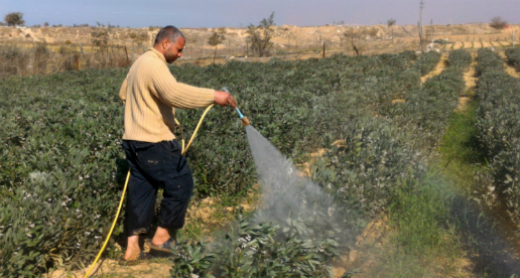
Omar Muslem Hamad Abu Zaher, 43, a farmer and married father of nine from al-Qararah, said in his testimony:
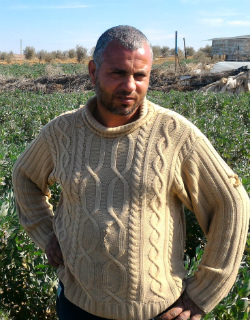
I used to work as a farmhand in Israel. Ever since the second intifada broke out, they’ve refused to give us work permits, and I’ve been working my land here. I own a plot of about a quarter-hectare, about 500 meters away from the border fence with Israel. This plot is my family’s only source of income. My two sons, Shadi, 18, and Ashraf, 17, help me cultivate it.
In September 2016, I planted fava beans on my plot. They start yielding after about four months. Once the plant reaches maturity, it can be picked about ten times, sometimes more. The plants in my plot yielded about 150 kg of fava beans every week. In early January 2017, I picked the first round of the crop and sold it in the market for a good price. In mid-January, I picked again.
Then, on 23 January 2017, Israeli planes came and sprayed herbicides along the border fence. I was in my plot that day, and I clearly saw the herbicides reaching my land and my plants. I turned on the water pump right away and started washing the plants. I kept washing them until the evening, to reduce the effect of the herbicides as much as possible, but it was no use. Three days later, the fava plants started showing stains and burn marks. Some of them wilted.
The Ministry of Agriculture warned us not to sell the crop that had been damaged by direct spraying, so I had to get rid of about 100 kg of fava beans that ripened after the spraying. Now, I’m waiting to see what happens with the plants. Maybe, if I wait patiently, the plants will bear fruit again, and I may have to plow the plot over.
This is not the first time that Israeli spray planes have destroyed our crops and caused us such distress. Last year, I grew okra in the plot and tended to the saplings for a few months. When the Israeli planes came and sprayed the land, they damaged all my saplings, and I had to plow the land over, because okra saplings can’t survive exposure to such chemical agents.
We feel that the Israeli side is doing this on purpose. They spray in the early morning, and when the wind blows from east to west, so it carries the herbicides toward our land. They do it to pressure us to stop planting in the plots that are near the border fence.






